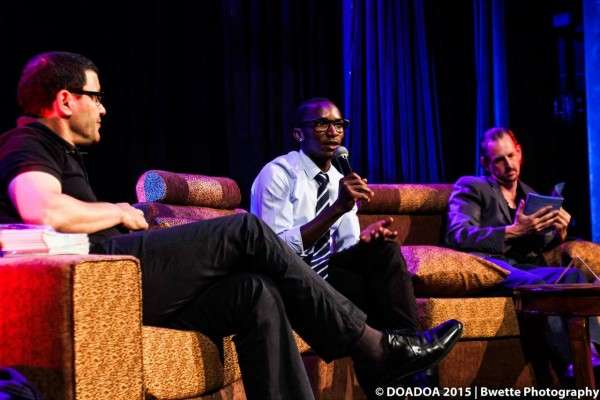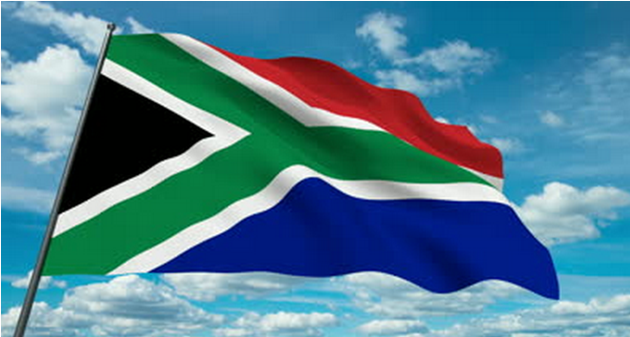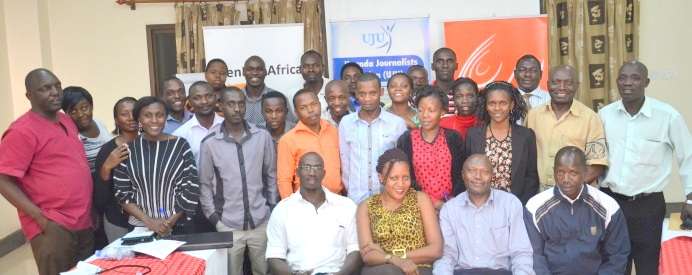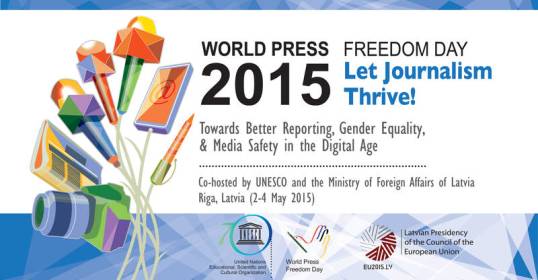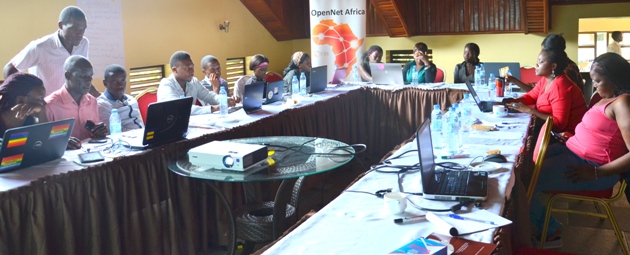By Juliet Nanfuka |
The creative industry provides a blend of literature, visual, audio, physical and verbal means through which to communicate complex social issues – increasingly complemented by online tools. In particular, the music industry in Africa is driving the digitalisation of content as it aligns itself with global trends.
There are locally developed apps to cater specifically to African content producers and consumers. Websites such as Fezah (Uganda),Mvelani (Malawi), Mkito (Tanzania) – which also offers a short message service option to source music through feature phones – and Spinlet (Finland, Nigeria, South Africa) are providing unique African music platforms through which content can be easily disseminated. These platforms are creating avenues through which African artists can promote, distribute and monetise their content while also reaching a global audience.
However, the economic potential that the music industry has – and by extension, other creative industries – is often overlooked. According to PriceWaterHouse Coopers, Kenya’s music market generated revenues of US$19.8 million in 2012, up from US$16.5 million in 2008, a figure projected to reach US$20.7 million in 2015. The report also indicated that spending on digital music will overtake physical spending in 2015.
In Nigeria, the music market generated revenues of US$51.3 million in 2012 with forecasts indicating further growth to reach US$53.8 million in 2017. The report further estimates spend on digital music content in Nigeria will rise to an estimated 66.6% of digital’s share of total spending on recorded music by 2017, up from 49.0% in 2012.
But a 2015 British Council report on the music sector in East Africa found that “the impact of digitisation on both music-making and distribution is not fully understood nor is it encompassed by statutory law, with most regulations having been passed before the digital revolution.” This impact purportedly spans beyond music, influencing other areas of the creative industry such as photography, visual arts including painting, graphic and digital design, sculpturepaint, dance and even literature.
Accordingly, last May, East African artists and performers convened in Jinja, Uganda for Doadoa, dubbed an “East African Performing Arts Market”, for a three-day event aimed at providing a platform for East African artists to engage with each other as well as to define the path that the creative industry takes in making itself more financially sustainable. Doadoa echoes the Festival au Désert in Mali and South Africa’s Moshito festivals which also connect artists from across the continent.
Discussions at DoaDoa explored issues of content creation, music production and commercialisation in a sector that is challenged by limited infrastructure, skills, geographic divides, piracy, and fractured protection of intellectual property. As more East Africans have gone online, so has the amount of content generated for both general and commercial consumption yet it accounts for just a small fraction of the global content available online.
Despite the increased amount of online content produced, there remain few laws applicable to the creative industry and for those in existence, there is limited enforcement. An ArtWatch Africa 2013 report on Monitoring Freedom of Creative Expression noted the limited priority and commitment that African national constitutions have for guaranteeing freedom of creative expression or cultural rights. As such, there have been reports of abuse and infringements on artists’ rights when their work challenged political, religious and social norms.
For instance, in September 2014, South African artist Brett Baily struck a nerve when his piece, Exhibit B, on exhibition in London challenged racism. Fellow South African activist and photographer Zanele Muholi has also received criticism for her work depicting the brutality that black lesbians face in the hands of their communities. In 2012, a Ugandan play titled “State of the Nation” was cancelled by the Media Council because of its subject matter of corruption and poor governance, while in 2013, Daniel Cecil, a British theatre producer, was deported from Uganda following work on a play that had a gay character.
However, despite the emergence of bills applicable to the creative industry such as Kenya’s National Design Bill 2015 or the East African Community Creative and Cultural Industries Bill, 2014, there remains little explicit mention in the bill of online media as a tool increasingly used in the creation and dissemination of artistic and cultural content. Similarly, there are no legal mechanisms to protect and promote a regional online creative economy. Kenya however has released their National Design Bill which established the Institute of Designers Kenya. It however limits creative expression to members of the (IDK) thus posing a challenge to creatives without the means to pay the registration fees for membership with the institute. It also makes limited mention of online design content.
As creative content has become pivotal in the digital economy, the need to protect it as a form of expression is key to its sustainability both online and offline. Creating symbiotic relationships between the artistic community across the continent, online advocacy groups and human rights defenders in pursuit of more locally driven and cohesive advocacy on social issues such as freedom of expression, privacy, data protection and surveillance is key.
Image: Bwette Photography
Online Censorship in South Africa
South Africa is among the top five African countries with the highest mobile broadband reach, preceded by Ghana, Zimbabwe, Namibia and Egypt. As of June 2014, internet users had increased to 52% of the population, majority of them using mobile devices to access the internet.
Although the country has been ranked free in internet freedom rankings and held highly in respect to promoting equal rights, recent developments in the offline and online world say otherwise.
In March 2015, a consumer activist who runs the CAMcheck blog that reports on misleading claims made by consumer goods providers, was forced to move his website offshore following a take-down request made by sports supplement company USN for content described as “unsubstantiated and defamatory”.
According to Section 78 of the Electronic Communications and Transactions Act (ECTA) 2002, ISPs are not obliged to monitor the data they transmit or to actively seek facts or circumstances indicating an unlawful activity. Service providers are, however, liable for failure to comply when issued with takedown requests from users as provided under Section 77 of the Act.
It is thus no surprise that Hetzner, the CAMcheck blog web hosting provider, also a member of the South Africa Internet Service Providers Association (ISPA), complied with the take down request.
Also in March 2015, the Film and Publication Board (FPB) gazetted a Draft Online Regulation Policy, 2014, which contains clauses that have the potential of blocking online content – including films, games and certain publications – prior to publication.
The regulations require that anyone wishing to publish or distribute such content has to first acquire a digital publisher’s online distribution agreement with the FPB, after paying a subscription fee. Once paid, the publisher would have to submit the content to the FPB for classification prior to publishing.
The FPB has the mandate to regulate the creation, production, possession and distribution of films, games and certain publications by way of classification, to protect children from exposure to disturbing and harmful material and from premature exposure to adult material and to criminalise child pornography and the use and exposure of children to pornography.
The Draft Online Regulation Policy states that, the policy, “read with the Online Regulation Strategy and the ECT Act Amendment Bill, will also ensure that classification focuses on media content, rather than on platforms or delivery technologies.”
However, civil society organisations have criticised the draft policy, stating that they are “effectively a specific form of pre-publication censorship, which is not acceptable.” They also add that the time spent on the pre-classification of content would undermine one of the most valuable traits of the internet – its immediacy.
Further concerns about the new regulations include the exclusion of content by parties unable to pay the fees required and thus a potential limitation on the diversity of online content.
But online content censorship is not new in South Africa. In 2012, “The Spear”, a controversial painting by Brett Murray which depicted President Jacob Zuma with his genitals exposed, was published on the City Press website – a daily newspaper. President Zuma and the African National Congress Party obtained an order for the removal of the image from the website of City Press on the grounds that it was unfit for viewers under the age of 16, according to classifications by the FPB. The Goodman Gallery (where the painting was displayed) approached the FPB Appeal Tribunal which found that the ruling in favour of the injunction was incorrect. The City Press nonetheless removed the image from its website.
Meanwhile in the first quarter of 2013, the South African Counter Intelligence Agency made a content removal request to Google for a blog post that was ‘allegedly infringing copyright by criticizing a media release that the agency had issued.”
Although this request was denied, past incidents together with recent developments in the country bring to the fore the crucial online freedom issues of intermediary liability and freedom of expression.
In its 2014 State of Internet Freedoms in South Africa report, the Collaboration on International ICT Policy for East and Southern Africa (CIPESA) highlights these gaps. It states that the absence of detailed provisions in the guidelines for recognition of industry representative bodies of ISPs “creates a situation where ISPs are not free to establish any ’notice’ or ‘notice and put-back’ mechanism, which would allow the user to respond to the allegations of infringement or, respectively, to provisionally restore the allegedly infringing content.”
The ECTA Amendment Bill of 2012 attempts to address some of the existing gaps by introducing Section 77A, which provides consumers with the right to be heard by ISPs before a takedown notice is enforced. However, this section still has limited provision for a user to respond to the allegations of infringement or to provisionally restore the allegedly infringing content. ISPs are merely required to respond to a “first take-down notice” within 10 business days (lesser days if the complainant can demonstrate irreparable or substantial harm).
The 2014 report calls for a review of South African legislation that is applicable to online freedom, specifically pointing out the need for immediate revision of the Films and Publications Act.
The report also recommends increased dialogue between civil society and policy makers to progressive law reforms, including a review of legislation that have actual or potential chilling effects on internet freedom.
Read the full State of Internet Freedoms in South Africa Report here.
World Press Freedom: Ugandan Journalists Convened for Digital Security Training
By Juliet Nanfuka |
On May 2, a total of 27 Ugandan journalists were trained in digital security procedures. The training was held in commemoration of World Press Freedom Day (May 3), which this year was celebrated under the theme “Let Journalism Thrive! Towards Better Reporting, Gender Equality, and Media Safety in the Digital Age”.
The training, which was organised by the Collaboration on International ICT Policy in East and Southern Africa (CIPESA) in partnership with Uganda Journalists Union (UJU) and the East and Horn of Africa Human Rights Defenders Project (EHARDP), explored the status of journalism in Uganda as well as the legal and regulatory frameworks affecting freedom of expression in the country. Participants at the training workshop represented print, online and broadcast media houses from across Uganda.
During the training, it emerged that some journalists are not cautious about their online security, similar to those in a previous training hosted by CIPESA. The reuse of one password across different websites and platforms, and overexposure of personal information online were common among the training participants. Email encryption, the use of Virtual private networks (VPNs) and Multi Factor Authentication for passwords, were taught as skills that can aid journalists when investigating sensitive stories that may be prone to surveillance.
Norman Katende, an international award winning journalist, shared his experiences of being threatened while reporting on controversial stories and encouraged journalists to practice caution both online and offline. He questioned how journalism can thrive in the face of police attacks on the media, noting that journalists should not compromise on their security when covering sensitive stories just to earn a living.
According to the Committee to Protect Journalists (CPJ), an international organisation that defends the rights of journalists, over the past two decades, 1125 journalists across the world lost their lives while reporting or investigating stories. The medium increasingly used by journalists to source and disseminate information is the internet.
Last month, Somalia journalist Daud Ali Omar and his wife were murdered. The same month, Kenyan journalist Johan Kituyi, proprietor of the newspaper Mirror Weekly, which has covered controversial national issues, was also murdered.
Increasingly, online publishers and bloggers are also coming under attack in Africa. For instance, a year after their arrest, the Ethiopian Zone9 bloggers remain behind bars and in Burundi, civil unrest related to upcoming elections has led to government restrictions of information flow through various media houses – and radio stations.
Such attacks necessitate digital safety skills for journalists. “When you look at the level of knowledge on ICT that a journalist has – it’s really basic. We have several unsecured email accounts and we visit any website without [considering] security,” noted a journalist at the training in Kampala.
Journalists noted that they do not always exercise their rights and do not request security from their media houses when pursuing sensitive stories. They also indicated a lack of awareness of the laws in place that can aid them in developing stories, such as the Access to Information Act (2005), which compels Ministries, Departments and Agencies to release information.
Following a CIPESA presentation on the legal and regulatory frameworks affecting internet freedom, especially freedom of expression online in Uganda, a Soroti-based journalist said the training had made him re-evaluate how he used his mobile phone and the internet, saying that he had been using these tools “without considering their implications.”
Further to the commemoration of World Press Freedom day, CIPESA participated in the “Digital safety for journalists” plenary session of the global event hosted by UNESCO. CIPESA and its partners in various countries were also involved in a series of Twitter engagements which explored press freedom, including in the digital world, particularly for African journalists.
The training was conducted in the context of CIPESA’s OpenNet Africa initiative that promotes internet freedom in Africa and is supported by the Open Technology Fund, Hivos and the Association for Progressive Communications (APC).
Let Journalism Thrive! Towards Better Reporting, Gender Equality, and Media Safety in the Digital Age
UNESCO |
Every year, 3 May is a date which celebrates the fundamental principles of press freedom; to evaluate press freedom around the world, to defend the media from attacks on their independence and to pay tribute to journalists who have lost their lives in the exercise of their profession.
Over 100 national celebrations take place each year to commemorate this Day. UNESCO leads the worldwide celebration by identifying the global thematic and organizing the main event in different parts of world every year.
The international day was proclaimed by the UN General Assembly in 1993 following a Recommendation adopted at the 26th Session of UNESCO’s General Conference in 1991. This in turn was a response to a call by African journalists who in 1991 produced the landmark Windhoek Declaration on media pluralism and independence.
To mark the 2015 World Press Freedom day, UNESCO will lead the global celebration with a main event under the theme “Let Journalism Thrive! Towards Better Reporting, Gender Equality, and Media Safety in the Digital Age”. The event is co-organized by UNESCO and the Government of Latvia, and will take place from 2-4 May 2015 in Riga, Latvia.
The Collaboration on International ICT Policy in East and Southern Africa (CIPESA) will be participating in the event represented by Wairagala Wakabi as one of the speakers in the Plenary 3 Session on “Digital Safety for Journalists” on 4 May 2015. The discussions during this session will be enriched by CIPESA’s experience and expertise, particularly under its OpenNet Africa initiative.
Meanwhile, on May 2, CIPESA will convene journalists in Kampala, Uganda for digital safety training as part of its ongoing online security capacity building efforts for human rights defenders, minority groups, activists and the media in East Africa.
CIPESA Conducts Digital Safety Training for Journalists and Activists in Tanzania and Uganda
By Ashnah Kalemera |
This month, the Collaboration on International ICT Policy in East and Southern Africa (CIPESA) has given training to human rights defenders, journalists, bloggers and media practitioners in Tanzania and Uganda in safety and security tactics to promote privacy and freedom of expression online.
The training, conducted in Kampala on April 10 and in Dar es Salaam on April 14 and 15, also helped participants to understand the laws and policies governing digital communications in the two east African countries.
The trainings explored basic computer security for operating systems, data storage and software updates. In addition, safety and security tips for using social media such as Facebook and Twitter, email and mobile communications were shared. Strong emphasis was placed on ensuring privacy of these communication tools and creating strong passwords. The trainings also explored techniques for responding to surveillance and censorship using anonymous browser tools, Virtual Private Networks (VPN) and Encryption.
Participants in the two countries shared their experiences – with varying levels of expertise – in securing their communications.
“I do not share my laptop regardless of who you are,” stated one Ugandan participant. He added that he did not access his email on phone or at internet cafes, cautioning the participants who did. “Any email has to wait until I get to my encrypted laptop,” he said.
A Tanzanian journalist said that whereas she makes the effort to secure all her devices and online user accounts, she often used the same password across board. This highlighted the shortage of digital safety skills among some of the most regular users of digital technologies in the country.
Participants in both trainings noted that in some cases, civil society organisations were “lazy” in adopting the latest technology to ensure the safety and security of their operations and their staff online. In other cases, financial resources were a limitation. Another challenge highlighted was the slow internet speeds in both countries, hence forcing users to access the internet on several devices.
On the legal and regulatory front, discussions centered around the proposed Cyber Crime Bill in Tanzania and the Uganda Data Protection and Privacy Bill and the need for the two countries to adopt laws that support internet freedoms.
Participants also raised concern about recent developments in neighbouring Kenya and their potential impact on the use of information and communication technologies (ICT) across all member states of the East African Community.
Participants in both the Tanzania and Uganda trainings called for increased awareness of online freedom amongst internet users, particularly vulnerable groups such as women and youth to promote greater appreciation for the need to adopt safety and security practices online.
Overview of training beneficiaries
Individuals from 27 organisations benefited from the training, out of which an average of 33% were women and 67% were men.
Figure 1: Training beneficiaries by gender

Figure 2: Training Beneficiaries by user/organisation category


The trainings were organised by CIPESA in partnership with the Pan African Human Rights Defenders Project and Jamii Forums in Uganda and Tanzania respectively in the context of CIPESA’s OpenNet Africa project supported by Hivos, the Open Technology Fund and the Association for Progressive Communications.
Upcoming digital safety skills engagements include for journalists in Uganda (to coincide with World Press Freedom Day on May 3) and for the local tech community.

